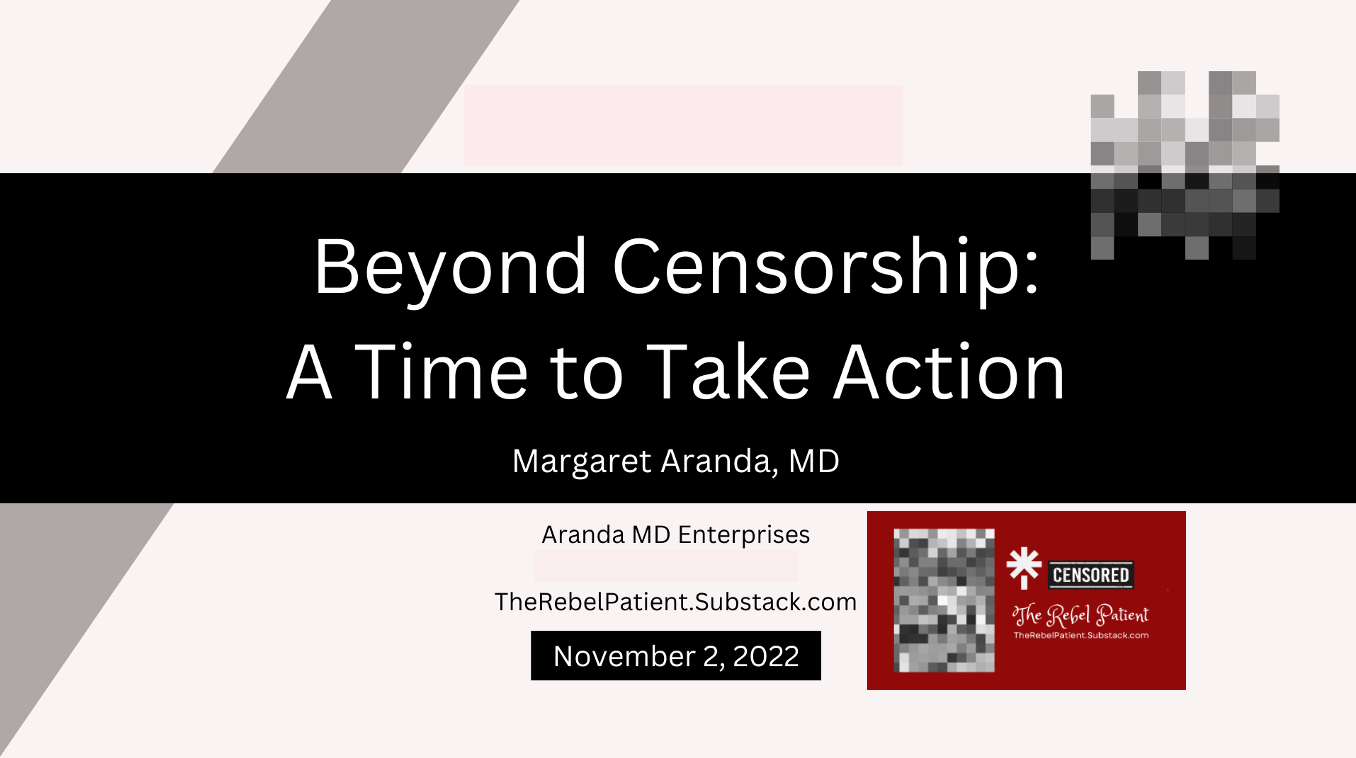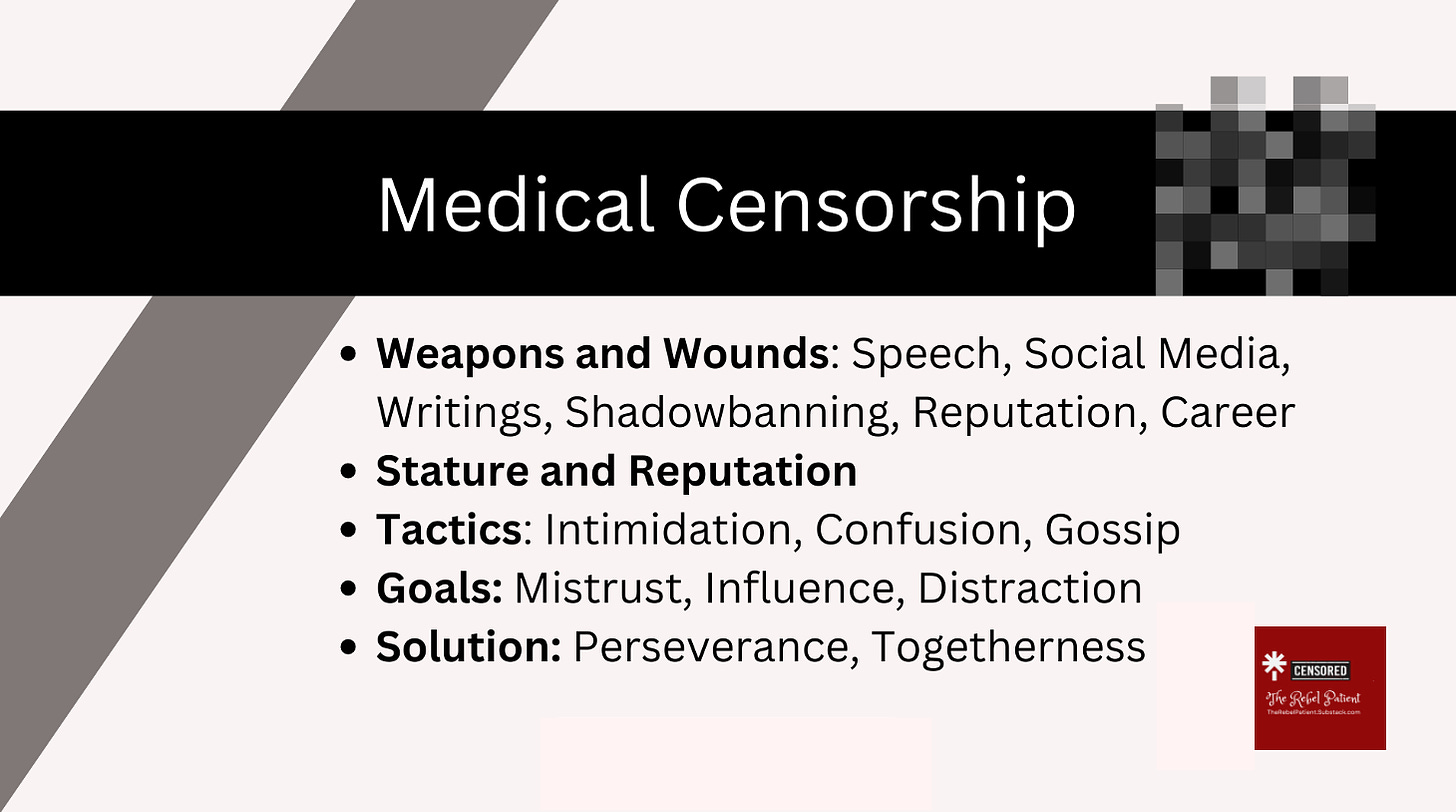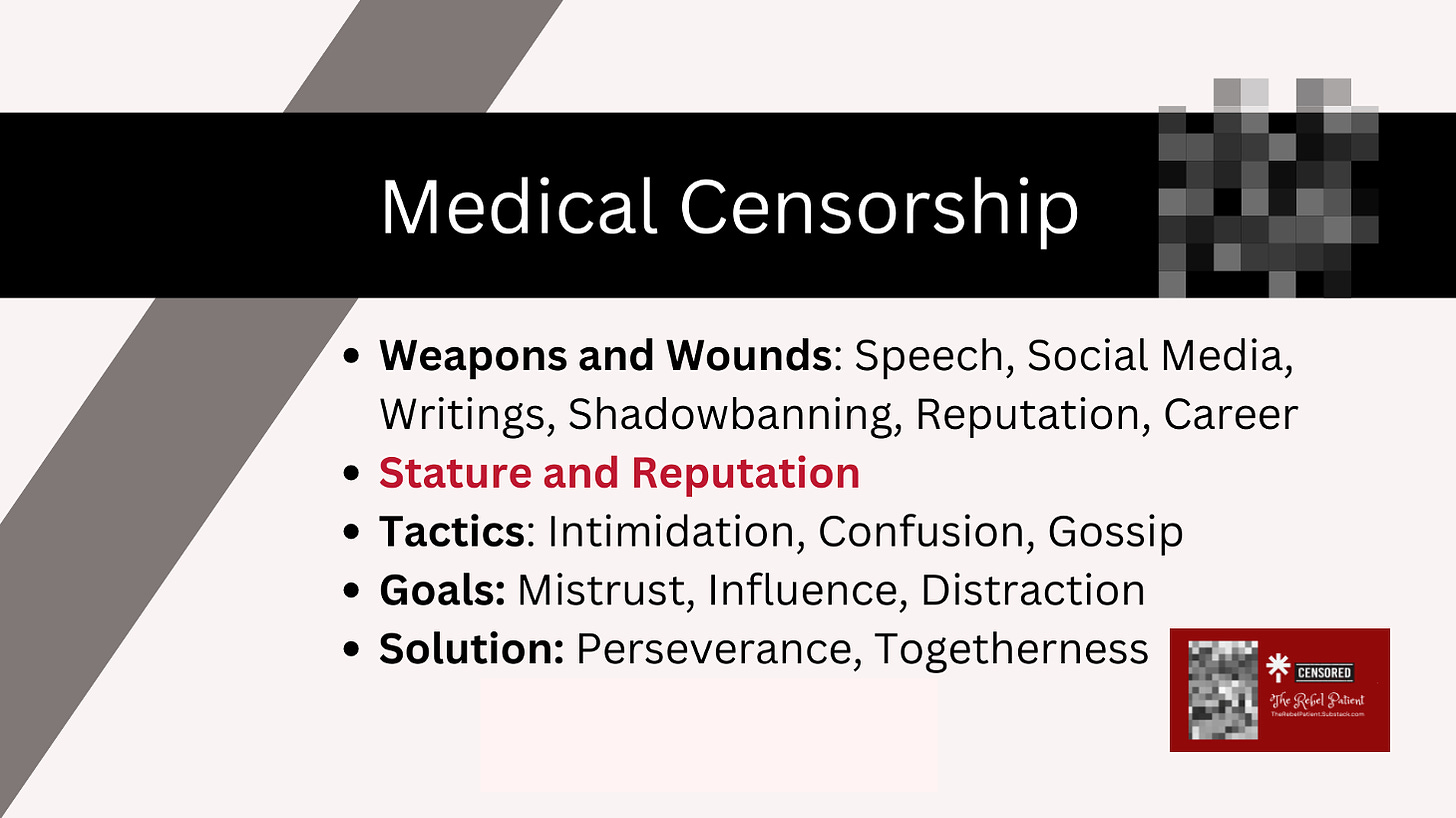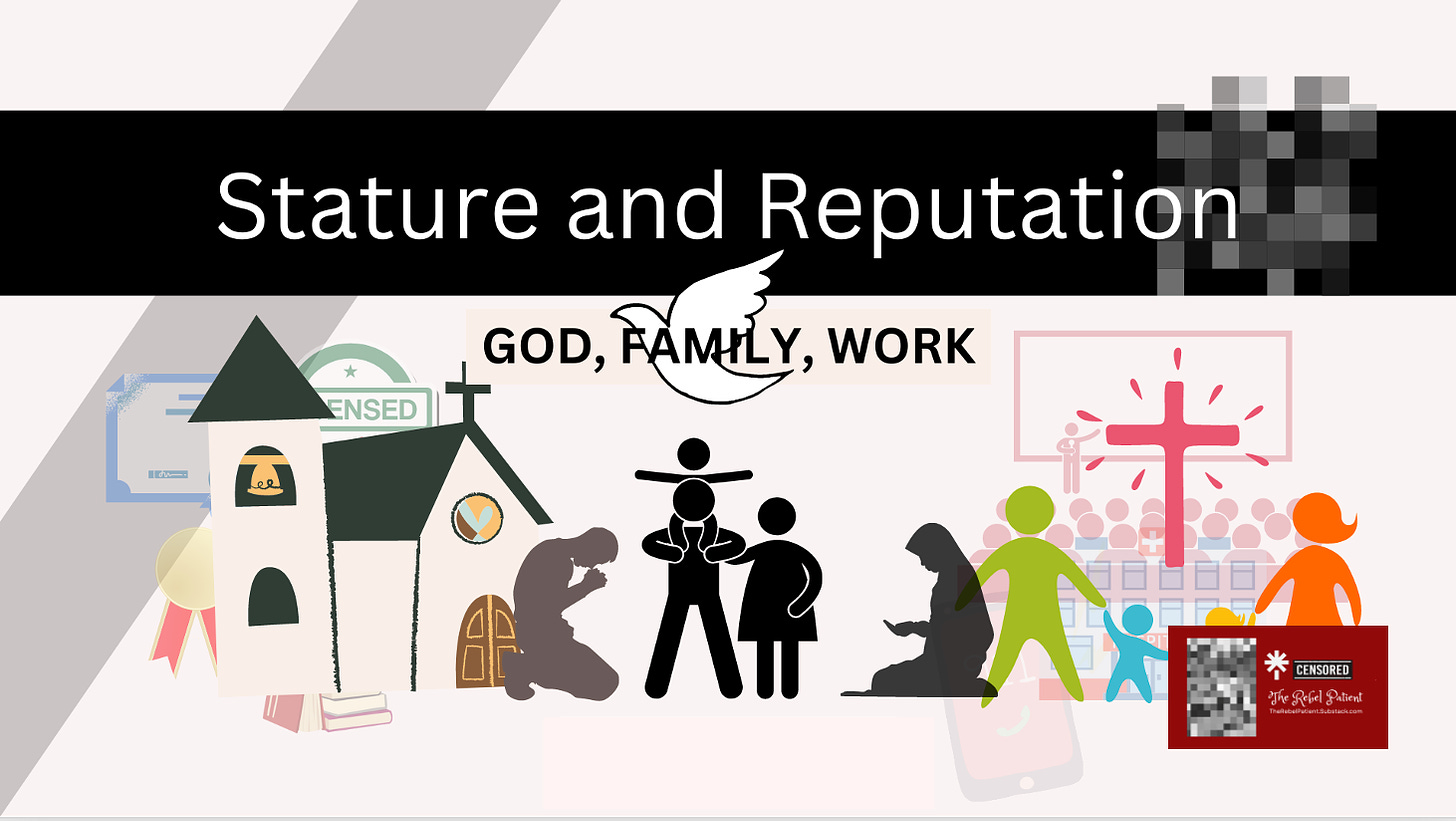Beyond Censorship: A Time to Take Action
Part 1: Censorship and Reputation, Intimidation, Warfare, Countermeasures, Goals and Solutions
A new paper was published in the well-published journal Minerva, which is a sociological and historical study of science and knowledge. It is a respectable Springer publication by Yaffa Shir-Raz et al., including my acquaintance and friend Josh Guetzkow, published on Substack and available as a free PDF. Here is the title of Josh’s Substack:
Hot off the presses! "Censorship and Suppression of Covid-19 Heterodoxy: Tactics and Counter-Tactics"
The link to the original paper on Springer is here: https://link.springer.com/article/10.1007/s11024-022-09479-4 and you also may access it through Josh’s Substack (although the publisher “sees” the hits better on the Springer website directly above).
This article triggered my summary, and bring up several questions regarding the censorship of medical information, its direct and ripple effects, its effects on society, medicine and public health, and what has been done to counter these kinds of attacks.
My conclusion is that it is time to take action.
Here is the paper “Abstract” or a short version of an introduction, goals, methods, results and conclusions. Every scientific paper has all of these components. It is worth a good read.
Abstract
The emergence of COVID-19 has led to numerous controversies over
COVID-related knowledge and policy. To counter the perceived threat from doctors
and scientists who challenge the official position of governmental and intergovern-
mental health authorities, some supporters of this orthodoxy have moved to censor
those who promote dissenting views. The aim of the present study is to explore the
experiences and responses of highly accomplished doctors and research scientists
from different countries who have been targets of suppression and/or censorship
following their publications and statements in relation to COVID-19 that challenge
official views. Our findings point to the central role played by media organizations,
and especially by information technology companies, in attempting to stifle debate over COVID-19 policy and measures. In the effort to silence alternative voices,
widespread use was made not only of censorship, but of tactics of suppression that
damaged the reputations and careers of dissenting doctors and scientists, regardless
of their academic or medical status and regardless of their stature prior to expressing
a contrary position. In place of open and fair discussion, censorship and suppression
of scientific dissent has deleterious and far-reaching implications for medicine, sci-
ence, and public health.
Medical Censorship Effects
When I think of all the effects that medical censorship has on us, these are the topics I would like to see discussed.
Sit back and think of the (lies) things you have seen that in time, simply made no sense. What were they? How did that make you feel? Here are some of my thoughts, some in this paper and some not:
Medical censorship is a weapon that causes wounds
We may not realize it, but censorship is a ploy of destruction and how we handle it, how we react to it, determines what it does to us. First of all, we need to determine and define that it is a weapon.
Like any weapon, when does it get pulled out?
When there is a threat.
And like any weapon, what it it’s goal?
To cause damage, and fatal damage, if possible.
Weapons and Wounds
Censorship is a weapon that limits speech, gets used by big tech and social media, affects both written and verbal speech, and has some pretty grave results. The results affect livelihood, reputation, and the career of doctors and scientists, many of whom wanted to help by offering another alternative during the pandemic besides just a COVID vaccine.
Do you know how much guts it took (takes) to prescribe ivermecin or hydroxychloroquine?
In our decade + of training, we never prescribed a new medication without watching the patient, seeing the effect and the side effects. Then along came the pandemic, and there was no one to teach us how to prescribe ivermectin.
Many prescribed ivermectin without ever doing that once in their lives.
There were protocols to follow, like those at flccc.net. But there was no one to watch when the first patient took it, nor to advise us on what to do if something happened.

Like spilling pink and blue paints next to one another, prescribing ivermectin was an experiment. No one was expected to be harmed, and no one was, but we were not trained to know what would happen.
Not All Doctors Were Qualified to Give Ivermectin
One of the reasons we wanted to provide an alternative to vaccines was not because we were “anti-vaccine”, but because we were trained scientists who knew that the shots were not and could not have been safely manufactured in such a short time.
To many, it was suspicious from the beginning.
Also, as an anesthesiologist trained to paralyze, sedate, and render unconscious any patient, and then bring them back to life again, I was good at pharmacology and had no trouble or hesitation to try a drug on a patient that I had never tried before.
In anesthesiology, most of the drugs I gave were through the IV and had an immediate effect. It was much easier to prescribe a tablet with a slow onset, one that almost no one could even tell they had taken. At followup after six months, most patients said,
“I cannot even tell that I am taking anything. It’s like a sugar pill without the sugar.”
Introduction
Here is an introduction to the paper, written as a follow up to the authors’ previous paper.
The authors interviewed scientists and doctors who faced censorship - many times, this led to adverse events, as these world-wide, anonymous interviews were of persons, “many” of which were “undoubtedly familiar”":
Doctors who faced censorship also faced suppression
The Training of A Doctor
We discussed how much training a doctor goes through, from college to medical school, vying to get into the “best programs”. To do this, many of us did research, spent summers in a lab or overnights in an ICU gathering data to publish years later, when the paper was finally perfectly written with all the data making sound decisions that could be defended.
The system taught us how to think. It taught us how to read scientific papers, how to evaluate the quality of the research, whether or not the goals were accomplished by the methods whether the conclusions were statistically significant, and how that applied to the problem in the first place. Many times, we suggested future studies, always thinking ahead to what would come in the future.
The medical system taught us how to critique, how not to just jump to the conclusions that the paper did, but to think for ourselves, independently. The system rewarded us for that, because we were critical thinkers that asked critical questions.
In this study, published just yesterday, Shir-Raz et al documented not only “what happened” when these famous doctors were censored, but what they did about it.
Responses to Censorship
What do you think these doctors did in response to having their accounts on Twitter or Facebook eliminated?
What about scientific papers in journals that decided to redact or retract them?
How would you feel?
All weapons cause wounds.
Stature and Reputation
Before you read on, what other words do you think of when you think of “stature” or “reputation”? Before you scroll down, think about it and name a few. These are the synonyms I think of:
Status
Credibility
Professionalism
Livelihood
Quality of Life
Riches
But wait. Let’s take another look at all the training a doctor had to go to just to finish something like cardiology:
A Decade and a Few Years
That is what it takes to become a cardiologist like Dr. Peter McCullough. Doctors literally devote their entire 20’s and sometimes half of their 30’s, when everyone else is at the prime of their lives, to medicine.
We not only have college and medical school exams, tests left and right with the biggest ones being the National Board Exams we can finally take after Residency in something like Internal Medicine. If we decide to be a Specialist, we do another 1-2 years of training, and again sit for the Specialty Board like cardiology.
During this time, we are expected to write papers, do research, win awards and be Top Doctor in the form of Chief Resident or a grant recipient. We do this while “On Call” every third night, suffer from loss of day:night cycles and feel jetlagged all the time.
That’s not all. Our beeper is constantly going off, we have to train the medical student how to draw blood, and then of course, when we get home it is time to change the diapers.
Our families make fun of us for sleeping after Thanksgiving dinner and skipping out on card games, doing dishes, and rubbing shoulders.
Our lives were never normal.
We did what we did because we had the promise of contributing to the future.
We Put God First
There is literally no doctor who has prescribed ivermectin for COVID who did so for any other reason that it being the right thing to do, before God and before the Hippocratic oath.
We put God first, our family second, and our work third.
You need to know that our dedication to work was enormous. But it was never half as bit as our dedication to God. Nothing even came close.
Thank you for reading my writings.
Keep reading with a 7-day free trial
Subscribe to The Rebel Patient™ to keep reading this post and get 7 days of free access to the full post archives.










